Digital healthcare solutions are booming right now. Nowadays, healthcare and technology are coming together to improve your health and wellness condition, identify the first signs of chronic diseases and assist with the necessary doctor's appointments.
Did you know that 59 percent of the people have a mobile health app while over 65 percent of the digital health tool users address their applications at least once per day. The statistics vividly show that global healthcare is on the verge of change and ready to battle current healthcare issues.
It’s fair to say that among all the healthcare industry trends the leading position is occupied by the fitness apps. Such mobile applications focus on maintaining physical health and wellbeing while saving user’s time and money. In fact, being fit is becoming a modern global health strategy due to the contemporary lifestyle pattern. Having long working days at the office, using gadgets that negatively affect the posture and finally, a busy schedule that doesn’t allow you to go to the gym creates urgent health issues for everyone.
The following market analysis and forecast was created due to our profound experience in the new product development in the digital healthcare market. Based on the 50+ mHealth startups, we would like to share recent data on the mobile health market. This article will cover all the major components of the mHealth industry - a consumer snapshot, competition, types of mHealth apps, and market potential.
Digital Health Industry: Market Outlook
The fast-paced digital technologies start merging with health and wellness industries creating a digital health symbiotic relationship. Moreover, over the last few years, the market of mobile health (mHealth) apps has been steadily growing while adopting new technologies - all of that contributed to the growth of digital medicine.
Subsequently, the digital health and wellness sector evolved into a powerful ecosystem that not only provides great opportunities nowadays but also has great potential in the future. With the adoption of mobile in the healthcare sector, the business opportunities for mHealth apps are huge.
A consumer snapshot. Modern healthcare consumers are more open to using intelligent technologies, sharing data and allowing a combination of man and digital technologies to power a new model of healthcare.
The report Accenture 2018 Consumer Survey on Digital Health stressed that consumers continue to show strong use of digital technology. Moreover, the numbers are rising exponentially each year. Recently there have been decreases in using websites. On the other hand, using self-service digital health tools like mobile, electronic health records (EHRs), social media and wearable technologies are increased. The mentioned healthcare industry sectors raised significantly in 2018 in comparison to 2016 (see the graph below for the detailed numbers).
In addition, significantly increased in the use of health apps and wearable devices since each year more and more consumers are willing to wear technologies to track their fitness, lifestyle and vital signs. The use of wearable devices, such as smartwatch and activity tracker, has more than tripled since 2014, from 9 percent to 33 percent. Speaking of mobile/tablet apps, nearly half (48 percent) of consumers use these devices, compared to just 16 percent in 2014.
Nowadays, consumers are willing to share their wearable health device data with their doctor (90 percent) or other healthcare professionals (88 percent). So, we can observe the shift of trust regarding the consumer’s privacy data. Consumers have less interest in sharing wearable device data with the government agency (41 percent) or their employer (38 percent). Instead of it, mHealth app users are willing to share data with their health insurance plan (up from 63 percent in 2016 to 72 percent in 2018) and with online communities or other app users (up from 38 percent in 2016 to 47 in 2018).
Competition. A significant rise in the number of health apps is also one of the reasons that have stimulated the growth of the market. The digital health market continues to grow and attract new entrants. At the moment, more than 84,000 mHealth app publishers have released mobile apps for the medical and health and fitness market.
According to Research2Guidance,the types of mHealth app publishers have increased in diversity. Therefore,
32 percent of the global mHealth market is traditional healthcare stakeholders such as hospitals, health insurers, and pharmaceutical companies;
28 percent of the market is occupied by purely digital market players such as mHealth app companies;
23 percent of the market is represented by non-healthcare companies including technology and app developer companies;
10 percent of the market is universities, NGOs and educational organizations;
Around 1 percent of the market is telecommunication companies.
Comparing the data from 2016 and 2017, it is noticeable that the mHealth app downloads reached 3.7 billion app downloads in 2017 - which is 16 percent more than in 2016. Nevertheless, with competition fierce, getting significant mHealth app reach is a big challenge. In fact, only 4 percent of the mobile health app publishers achieve more than 1 million downloads annually and only 15 percent achieve between 50,000 and 250,000.
Regarding the download statistics, wellness apps (diet and nutrition, lifestyle and stress, exercise and fitness) take the predominant place in the chart of the downloads.
Drink Water Reminder was the most downloaded Health and fitness category app worldwide for 2019 with around 13.5 million downloads. Swiggy, Flo, MiFit, BetterMe are rounded out the top five most installed health and fitness category apps worldwide.
Types of mHealth Apps. Technology in healthcare created a myriad of opportunities for everyone. From step tracking to pharmacy applications - nowadays a healthcare customers are able to have the full analysis of their health just with a couple of clicks. Nevertheless, the majority of healthcare businesses are general wellness related.
Health-related mobile apps and technologies manage the patient experiences through different applications, for example, step tracker or diet and calorie-counting mobile apps. In addition, “connection to doctors” has a great demand on the market, too. So, let’s take a look at different types of mHealth apps:
Fitness apps: a great helper during the work out routine, since it contains tips and popular workout programs with the focus on strengthening muscles and tone the body;
Activity tracking: step tracker or walk tracker are the great examples here - so on the daily basis applications tend to motivate you to take care of your health;
Diet and nutrition apps: provide the information on how many calories in a banana or calculate orange calories or calories in grapes to balance the healthy diet;
Stress management and meditation apps (including sleep cycle analysis apps): such apps include the different practice of meditation and how to deal with stress to help users to build a stress-free approach to different challenges;
Pregnancy tracking apps: such applications are no substitute for professional medical advice, however, this is an excellent way to track the baby’s growth over time;
Pharmacy apps: include up-to-date information on the latest prescription drugs, their interactions, side effects and uses;
Appointment management apps: works great for doctors and patients, since it gives doctors the list of available times to manage patients visits and clients get information about when they can enroll for a meeting, treatment and service.
A digital health market potential. The demand for digital health is rising on account of the increasing need to improve workflow efficiency across hospitals and other healthcare organizations, reduce healthcare costs, while at the same time focus on improving the quality of patient care.
As a result, the global digital health market is expected to rise exponentially in the coming years. The already multi-billion industry is likely to grow at an accelerated pace, as the healthcare sector welcomes digitization. Recent advancements in technology illustrate the inclusion of mobile, big data, cloud, and other developments. Thus, digital Health Market size was valued at USD $95.7 billion in 2018 and is expected to witness approximately 27.7% CAGR from 2019 to 2025.
Among the different regions (Asia Pacific, North America, Europe, the Middle East, and Africa and Latin America), the North America digital health market has emerged dominant. The expansion of this market is supported by both the presence of sophisticated healthcare infrastructure and the high adoption of advanced technologies. Factors like cloud-based storage systems and increased adoption of smartphones and tablets to track and monitor patient health and history work as a major trigger for the market growth.
It is predicted that mHealth apps' market size in 2025 will be around $50 billion. One of the major driving factors fuelling the growth of the mobile health market is the increased adoption of smartphones, as well as the continued heavy investment in the digital health market. Thus, there are over 318,000 mHealth apps available on the top app stores worldwide, nearly double the number of apps available in 2015 - with more than 200 apps being added each day.
The research Accenture 2018 Consumer Survey on Digital Health suggests that emerging technologies in healthcare are shifting the composition of the care team. Nowadays, consumers are increasingly benefiting from the current trends in healthcare. Thus, using digital technologies to manage their health, people are adopting virtual care, and they see the advantages of harnessing the collective power of humans and machines. It is no exaggeration to describe this is the emergence of a new era in healthcare. Patients, doctors, and digital innovations can work together to improve the accessibility, effectiveness, and affordability of healthcare.
And while the statistical majority of consumers take great advantage of mHealth technologies, specifically fitness and activity tracking apps; still there are a lot of people who aren't motivated enough to work out on a regular basis.
Conclusion
The involvement of digital technologies in the healthcare sector builds a myriad of opportunities for the modern healthcare consumer. Precisely, the emerging digital health and wellness industries create new products to track and manage your health and wellbeing.
Thus, the analysis shows that mHealth market segments include fitness apps, activity tracking apps, diet and nutrition apps, stress management and meditation apps, pregnancy tracking apps, pharmacy apps, and appointment management apps. Among all the segments the leading role occupies the step tracking apps, which will motivate you to stay fit with minimum money and time spendings.
The market analysis assumed an exponential increase in digital health tools consumption. It is suggested that digital Health Market size will be valued at $511 billion in 2026. These statistics prove the transformative pattern among the consumers towards the digitalization of the healthcare sector. Nowadays, consumers are willing to use wearable health devices and share their data with their doctor or other healthcare professional.
Finally, the growing value of the digital healthcare industry suggests the improvement of health conditions and prolonging life expectancy for every healthcare consumer. In fact, new technology in healthcare creates endless opportunities for human wellbeing. Even today implementation of Artificial Intelligence (AI) technology, the Internet of Things (IoT) and AR/VR start to be an ordinary practice in healthcare. Can you imagine the possibilities of digital healthcare in 20 years then?
Like this article? Visit our blog for more articles!


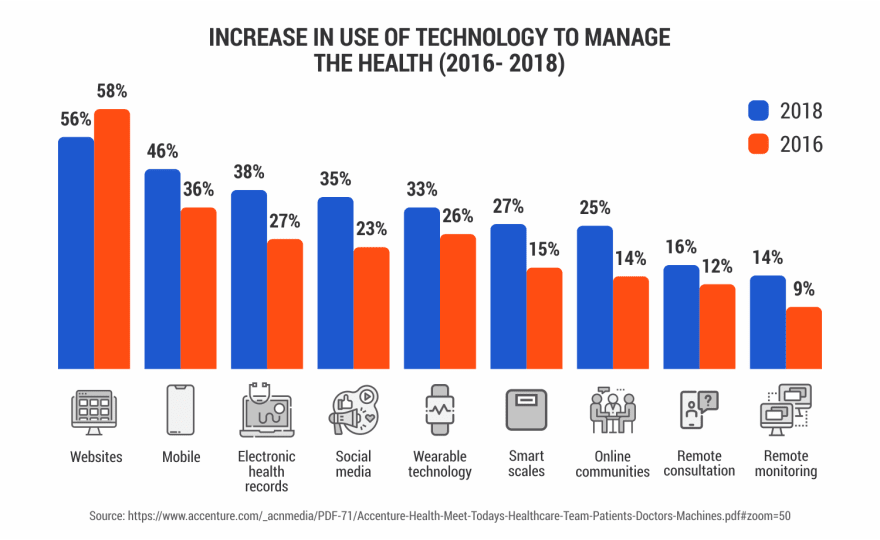

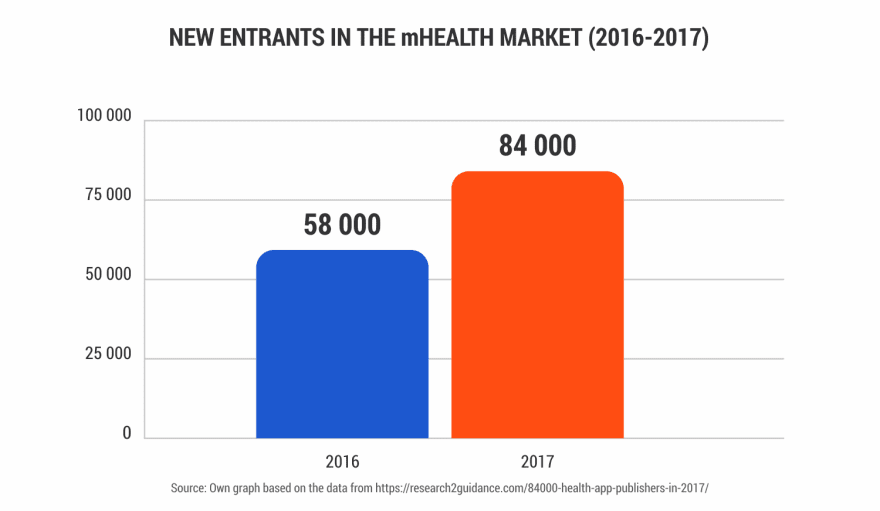
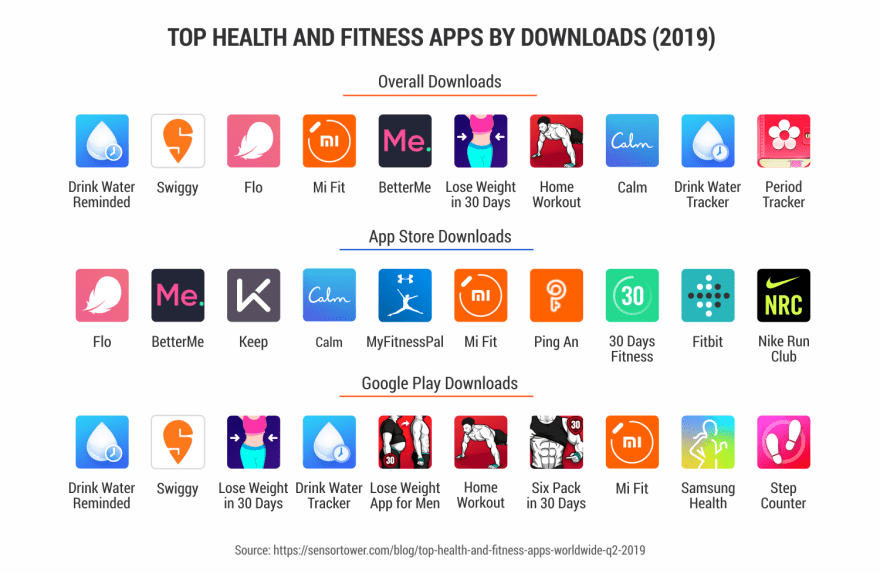
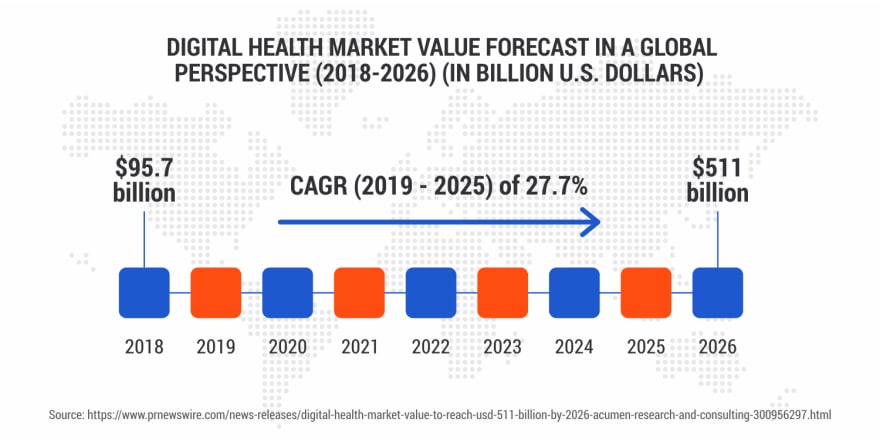
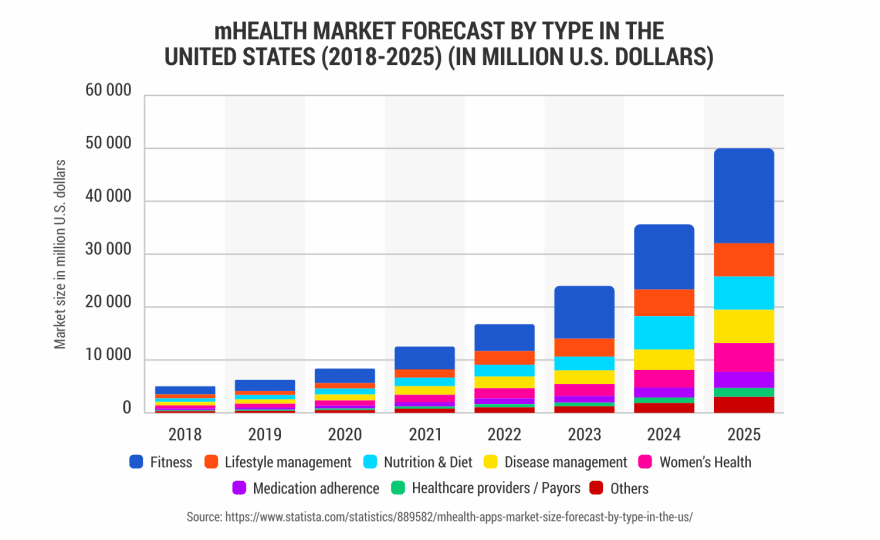

Top comments (1)
I agree that digital health technologies have become very popular, especially mobile apps for diets and nutrition. So if you are just interested in developing the best platform for nutrition weelorum.com/blog/diet-and-nutriti... I recommend you read this article. In it, you will learn what steps you need to take to bring it to life, as well as how much it will cost to create such an application.
Some comments may only be visible to logged-in visitors. Sign in to view all comments.